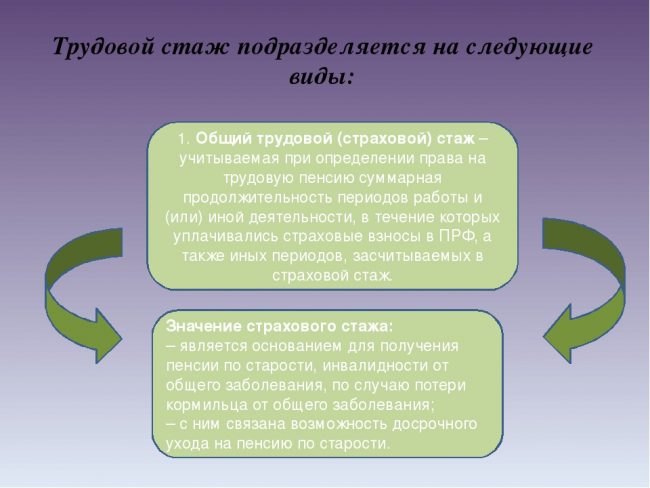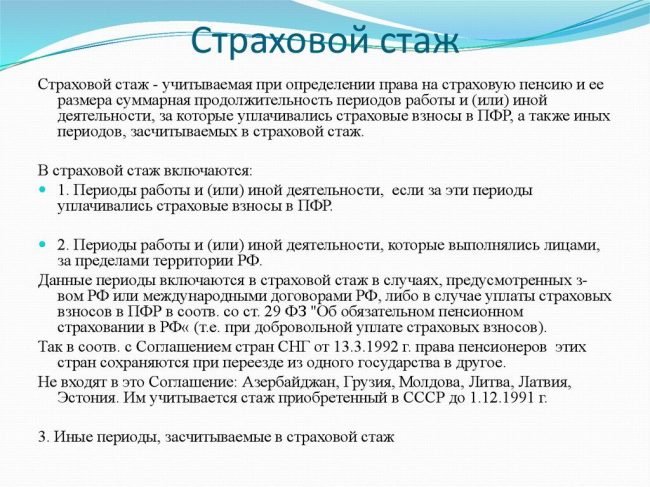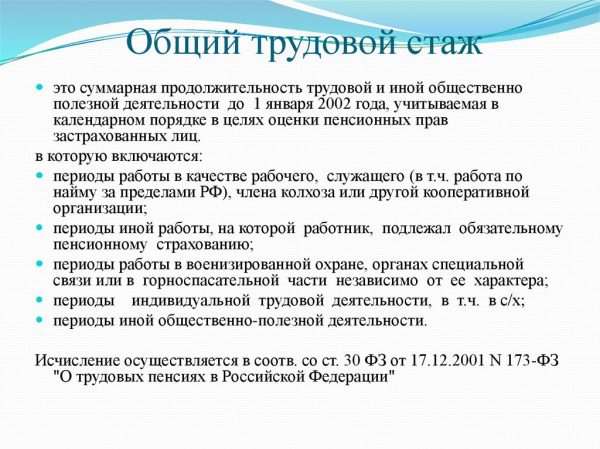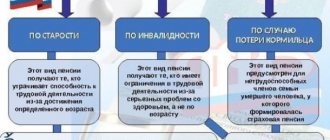In the modern legislative framework of Russia, there are two fundamental factors on which the amount of monthly pension payments depends: insurance and labor.
For workers who began their working career before 2001, these concepts are vague and do not contain any meaning about the real impact on pensions. This misunderstanding is caused by the concept of insurance length, which was absent until 2001, since previously only the total length of service was taken into account, that is, the employee’s constant work in one place without breaks of more than three months.
Military service and time spent on sick leave or child care were excluded from the total length of service. At the moment, the situation has changed and all periods have begun to be included in the amount of pension payments.
Let's consider what factors influence the calculation of pensions in 2020.
The concept of experience
In general, the concept of “experience” means the duration of something, any specific period. For example, the time spent working in a specific place, holding a particular position, is called length of service. According to the established rule, this period is calculated in calendar days, months and years.
In the field of pension provision, this term plays a very important meaning. So, in this case, length of service should be understood as a certain legal fact of the duration of the employment relationship, the parameter of which directly affects the possibility of assigning a pension and the size of the pension itself.
However, it should be taken into account that the law provides for several of its types, the differences between which are decisive for the assignment of monetary support.
Reference! The term “experience” is used in official regulations, which provide its definition in relation to a specific type of legal relationship.
For example, Federal Law No. 400-FZ of December 28, 2013 “On Insurance Pensions” gives an understanding of the meaning of the term “insurance period”.
When immigrating to the Russian Federation
In accordance with the new legislation, in the process of calculating pensions, those periods of time are taken into account when a person was engaged in work or any other activity that provided for the payment of insurance payments, specifically on the territory of Russia. But at the same time, our country is home to a huge number of people who previously lived in some other CIS countries and then decided to obtain Russian citizenship, which raises a logical question: will their length of service be taken into account when calculating their pension? , which they earned abroad?
In practice, records are kept, but only partially. Since 1992, all CIS countries with the exception of Azerbaijan have signed a special agreement that is related to this problem. This agreement states that if a person moves to some other country in the CIS, then in this case, when calculating his pension, his entire work experience should be fully taken into account, but special attention should be paid to the fact that we are talking exclusively about work experience , since this agreement was signed more than 20 years ago.
After the 2002 reform, a person’s work experience outside the Russian Federation is mandatory included in the person’s insurance record, but for this it is necessary to provide documentary evidence that in his country of residence the person made appropriate payments to the Pension Fund
Types of length of service when taking into account future pensions
The current Russian legislation distinguishes the following types:
- Insurance. Taken into account when assigning a pension of the appropriate type.
- General labor. Includes periods of a person’s labor activity.

The difference between them will be discussed in the article below.
In addition, the legislation also establishes additional types of experience:
- Special. Certain types of activities require special working conditions under which early disability occurs. In this regard, a special calculation of these periods is necessary to assign preferential (early) pension benefits.
- Length of service. At its core, the concept of “length of service” is close to the term under consideration, but is used, as a rule, to calculate periods of service for the military, police and some other categories of citizens.
Conditions
Dear readers! The article talks about typical ways to resolve legal issues, but each case is individual. If you want to find out how to solve your particular problem , contact a consultant:
8 (800) 700 95 53
APPLICATIONS AND CALLS ARE ACCEPTED 24/7 and 7 days a week.
It's fast and FREE !
Since 2020, many changes have been made to the pension system, due to which it has received two separate elements - these are the pension savings that a person collects throughout his life, as well as the so-called insurance pension.
It is worth noting that pension savings have not yet been introduced, so any citizen currently has only an insurance pension.
If a person wants to obtain the right to receive decent payments from the state in old age, he needs:
- Reach 55 years of age (for women) or 60 years of age (for men). It is worth noting that the legislation provides for a fairly large number of exceptions to this rule, providing for early accrual of pensions under various conditions.
- Have the appropriate length of service for which an insurance pension is calculated, which is 15 years . Moreover, this indicator will be put into effect only in ten years, while at the moment only its consistent increase from six years is envisaged.
- Accumulate a certain amount of individual points, the total number of which must be more than 30, but according to the adopted amendments, these indicators will also be introduced no earlier than eleven years later, and at the moment there will only be a consistent increase from 6.6.
The total amount of individual points is determined in accordance with the quantity and volume of insurance premiums the citizen pays to the compulsory health insurance system, as well as the length of service he has.
The concept of insurance experience
As a result of the reforms of the pension system, the insurance period is of decisive importance when assigning an old-age pension. It should be understood as contributions were made to the Pension Fund for a citizen, including a foreign state that is a participant in the compulsory pension insurance system
The obligation to pay them lies with the employer, who makes the corresponding transfers. Their size is 22% of the employee’s accrued wages.
Attention! Persons who, in accordance with the procedure established by law, have registered as individual entrepreneurs, as well as self-employed and privately practicing specialists, are required to transfer insurance premiums independently at the approved rates.
Thus, the insurance period can be taken into account only if deductions have been made. If, even if there is an officially registered employment relationship, no contributions were made to the Pension Fund, then this period of work is not included in the length of service.

How is it calculated
The insurance period is calculated by adding up the periods when insurance premiums were paid for a person. For the most part, this is the time of direct work or entrepreneurial activity.
However, we should separately highlight the so-called insurance periods, the correct calculation of which is of great importance for the corresponding calculation.
In accordance with the law, these must include:
- being on sick leave;
- caring for a child up to 1.5 years old;
- maternity leave;
- time to care for an elderly person.
This list is not complete or exhaustive.
Many older citizens are concerned about how their insurance coverage will be calculated for periods of work before 2002. This is due to the fact that such a thing as “insurance premiums” simply did not exist until that time.
However, these individuals need not worry as all these periods are taken into account by the pension fund. Payments under UTII and Unified Social Tax in the period from 1991 to 2002, as well as social insurance contributions before 1991, are equal to insurance contributions.
Implications for future pension
Changes in pension legislation, carried out as part of the corresponding reform, imply stricter requirements for recipients of insurance pensions. One of them is having a sufficient number of years of insurance experience. So, in 2020, the minimum number is 10.
If a citizen has worked for less time, then an insurance pension cannot be assigned to him.
The insurance period is not the only criterion for assigning an insurance pension . In this case, such a parameter as the individual pension coefficient (IPC), expressed in points, is also of great importance. In 2020 there should be at least 16.2.
Important! The IPC parameter affects not only the very fact of the possible assignment of a pension, but also the amount of future security.
How is experience confirmed when applying for a pension?
The Russian Pension Fund strives to reduce the level of paper document flow, including when interacting with insured persons, to a minimum. In this regard, since 2015, pensions are calculated based on information from an individual insurance account. They are contained in a single database of the Pension Fund.
A citizen has the right to access the relevant information by ordering an extract from the Pension Fund. In addition, you can find out about the account status in your personal account on the fund’s website.
However, in some cases, information about length of service in the Pension Fund database may be incomplete. In this case, entries in the work book are taken into account.
Table of values
The length of service coefficients for calculating old-age pensions differ depending on the gender of the pensioner and the total amount of time worked. For women, the table will look like this:
| Total work experience in years | Percentage of average earnings | The value of the coefficient by experience |
| 20 | 55 | 0,55 |
| 21 | 56 | 0,56 |
| 22 | 57 | 0,57 |
| 23 | 58 | 0,58 |
| 24 | 59 | 0,59 |
| 25 | 60 | 0,60 |
| 26 | 61 | 0,61 |
| 27 | 62 | 0,62 |
| 28 | 63 | 0,63 |
| 29 | 64 | 0,64 |
| 30 | 65 | 0,65 |
| 31 | 66 | 0,66 |
| 32 | 67 | 0,67 |
| 33 | 68 | 0,68 |
| 34 | 69 | 0,69 |
| 35 | 70 | 0,70 |
| 36 | 71 | 0,71 |
| 37 | 72 | 0,72 |
| 38 | 73 | 0,73 |
| 39 | 74 | 0,74 |
| 40 | 75 | 0,75 |
For the male part of pensioners, the distribution is as follows:
| Total work experience in years | Percentage of average earnings | The value of the coefficient by experience |
| 25 | 55 | 0,55 |
| 26 | 56 | 0,56 |
| 27 | 57 | 0,57 |
| 28 | 58 | 0,58 |
| 29 | 59 | 0,59 |
| 30 | 60 | 0,60 |
| 31 | 61 | 0,61 |
| 32 | 62 | 0,62 |
| 33 | 63 | 0,63 |
| 34 | 64 | 0,64 |
| 35 | 65 | 0,65 |
| 36 | 66 | 0,66 |
| 37 | 67 | 0,67 |
| 38 | 68 | 0,68 |
| 39 | 69 | 0,69 |
| 40 | 70 | 0,70 |
| 41 | 71 | 0,71 |
| 42 | 72 | 0,72 |
| 43 | 73 | 0,73 |
| 44 | 74 | 0,74 |
| 45 | 75 | 0,75 |
Separate articles on our website talk in detail about what kind of pension a person with , , , or years of work experience can expect.
What is work experience
It should be understood as all periods when a person carried out labor activities. Until 2002, pensions were paid taking into account this indicator. Today, length of service is not actually used when assigning pension benefits. However, it can be taken into account when establishing various benefits, benefits, and so on.

What is the difference between work experience and insurance experience?
Although these two concepts may seem identical in meaning, there are important differences between them.
First of all, there is a significant difference in the calculation method. Thus, length of service takes into account only periods of work activity. The latter involves, for the most part, hired work. The insurance company takes into account all periods during which contributions were made to the pension fund. This also applies to business activities.
Secondly, insurance is used as one of the criteria for assigning a pension. References to labor in the current legislation are fragmentary. It is not taken into account when assigning pension benefits. At its core, seniority is a kind of legal rudiment.
Previously, in the legislation there was such a concept as “continuous work experience”. It should be understood as periods of constant work without significant breaks associated with dismissal. The amount of temporary disability benefits received directly depended on it. However, it was canceled back in 2006 as contrary to the Basic Law of the country, and therefore is not used in calculations at this time.
Despite the similarity of definitions, there are fundamental differences between labor and insurance types of length of service. The first is practically not used in the current conditions, while the value of the second is an important criterion for assigning pension benefits.
Calculation methods

Working periods are calculated on a calendar basis (full months are taken into account - 30 days, full years - 12 months). The difference from the usual monthly calculation here is that only 30 days will be considered a full month. If it turns out that the working periods coincide in time, then only one of them is taken into account (a participant in the pension insurance system can independently choose which one by writing an application).
To calculate the total length of service in detail, you can use a simple example: an employee of an enterprise, Ivan Ivanov, provided a sick leave valid from September 20 to September 30, 2020 to the accounting department of the enterprise. An accountant needs to find work. employee book.
The following information is taken from it:
- from 01/01/14 to 07/20/14 Ivanov worked at the Kristall enterprise;
- from 07/22/14 to 08/25/16 – at Spectr LLC;
- from 08/26/16 to 08/29/16 – on .
- from 01.09.16 to 09.08.19 - at the ZRK enterprise.
As a result of calculating the insurance period for sick leave payment, the result is 5 years 7 months and 7 days. Therefore, the amount of sick leave for Ivan Ivanov will be: the level of average daily earnings * 80%. You can read more about calculating the insurance period for sick leave here.










